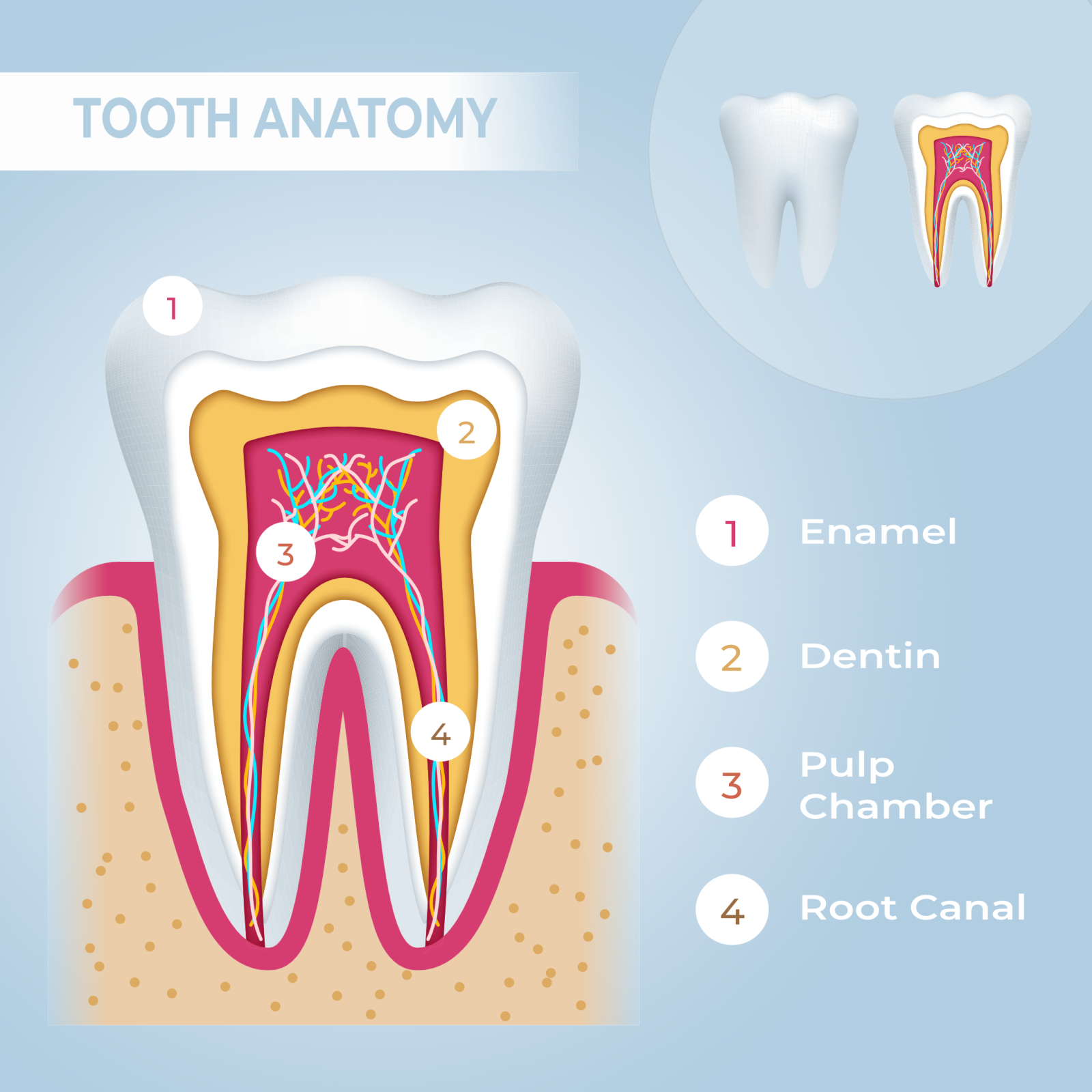2022 is here, and so is winter! January is a very cold month; with the stormy weather, we may notice that the cold air is causing a sharp pain at the base of a tooth… or two. What exactly does that mean and why is it happening? The most common answer is tooth sensitivity.
What is tooth sensitivity? It is exactly how it sounds, pain or discomfort in the teeth as a response to hot or cold temperatures. When the enamel in our teeth starts to wear down, exposing the dentin, or if our gums are receding, it will expose the layers where the nerves are. This is what triggers it. The pain could be temporary, or it may linger a bit becoming a chronic issue. It can affect one tooth or multiple teeth at the same time.
 anatomy of a tooth
anatomy of a toothSo, what triggers tooth sensitivity? The cause of it could be for multiple reasons:
- Tooth decay (dental caries/cavity): Tooth decay is caused by bacteria in our mouths that create acid attacks on the surfaces of teeth. An untreated cavity can lead to an infection in your tooth, this is referred to as a tooth abscess.
- Cracked teeth: Chipped or broken teeth become filled with bacteria from plaque and will start to enter the pulp, which causes inflammation.
- Teeth grinding: Chronic grinding or over clenching our teeth can cause tooth enamel to wear down over time. This leads to the dentin underneath being exposed.
- Brushing too hard: Over time, brushing our teeth roughly or using a hard-bristled toothbrush (use the soft ones!) can also wear down the enamel and cause the dentin to be exposed. Did you know that using a hard toothbrush can also cause a receding gum line?
- Acidic foods: Certain food, especially ones with a high acid content can also make our teeth sensitive. Foods such as citrus fruits, sour candies, tomatoes, pickles, and tea can cause the enamel to wear down.
Sometimes, other conditions will lead to tooth sensitivity that we wouldn’t even think about. One could be gastroesophageal reflux (GERD). GERD occurs when stomach acid frequently flows back into the esophagus that connects our mouth and stomach. Acid that is constantly coming into our esophagus can wear down our enamel over time. It is important to always be aware of what can potentially damage our teeth.
If you’re experiencing tooth sensitivity or if you’re ready to have your teeth checked out, schedule your appointment today. We’ll check to see if there are any potential problems and catch them while they’re small. Remember, often cavities and tooth cracks show up on x-rays long before we feel that they’re there.
Fear not, having sensitive teeth is very common and treatable. The treatment you receive is based on what is causing the sensitivity. If the sensitivity you’re feeling is mild, several over-the-counter options can help alleviate the discomfort. Changing your toothpaste can make a difference. Remember to choose a toothpaste that is made specifically for sensitive teeth. These will have desensitizing ingredients that help block the discomfort. Sensodyne is a great example of a toothpaste that can help with sensitivity. Other common treatments for sensitivity include:
- Alcohol-free mouthwash: The absence of alcohol, it’ll be less irritating for sensitive teeth. Some mouthwash use fluoride as the main ingredient to help strengthen the enamel and minimize sensitivity. These are also a good choice, especially for kids.
- Root canal: If decay is present in the root, your tooth needs cleaning out, and then re-packed with a filling. After that, a crown is set on top to protect the tooth from further damage.
- Surgical gum graft: This is used when root exposure is the cause of sensitivity. Soft tissue is taken from another part of your mouth and used to fill in the gaps. Since there are many types of gum recession, your oral surgeon will work with you to recommend the best treatment for your oral health.
With sensitive teeth, it’s very important to remember to keep up with your daily dental hygiene. It is very common and can affect anyone. Brush 2x a day with a soft-bristled toothbrush, use fluoride mouthwash, and floss daily. Our teeth should always be a priority because our smile is the first thing people notice about us… after we unmask!